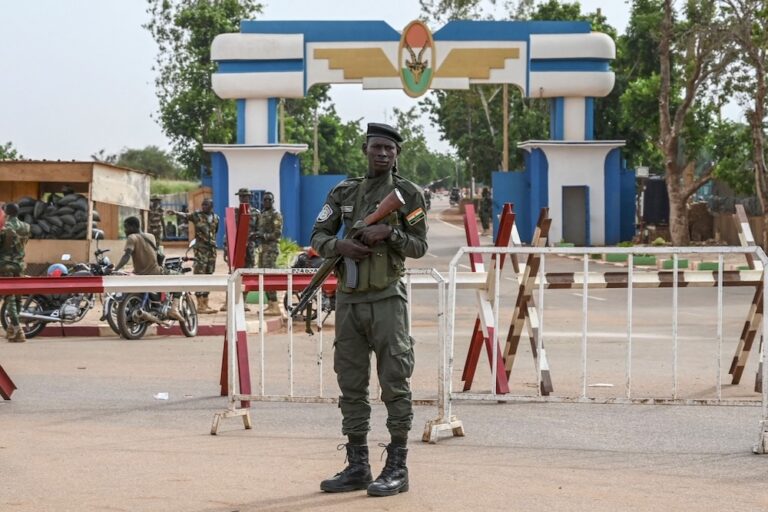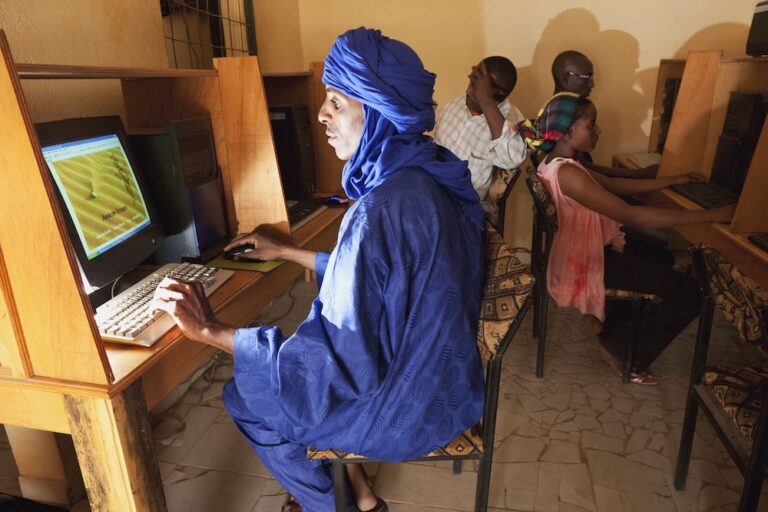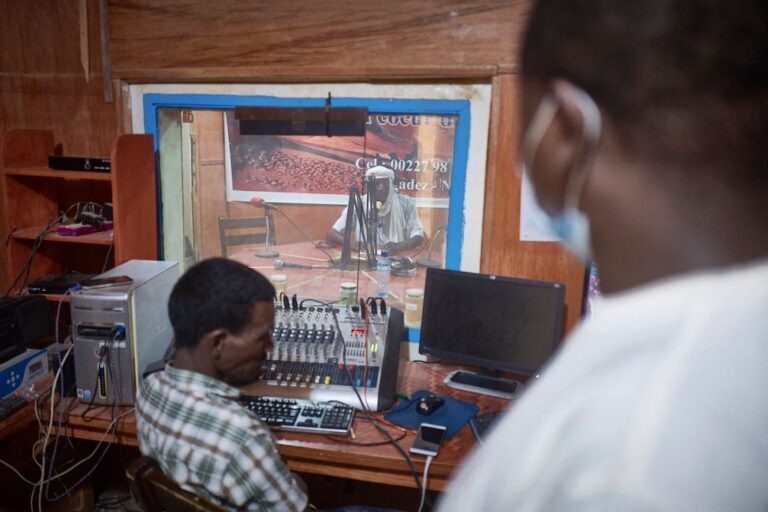(RSF/IFEX) – In a 6 May 1998 press release, RSF expressed its “great concern” over the fate of Niger’s media, which have been victims of multiple attacks recently. Since 15 April, two journalists have been arrested for mentioning the activities of the opposition; two others were hospitalized after being attacked; four radio stations have been […]
(RSF/IFEX) – In a 6 May 1998 press release, RSF expressed its “great
concern” over the fate of Niger’s media, which have been victims of
multiple attacks recently. Since 15 April, two journalists have been
arrested for mentioning the activities of the opposition; two others were
hospitalized after being attacked; four radio stations have been banned from
broadcasting statements by the leaders of the opposition; one of these
stations was shut down; and the main printing house in the country, which
publishes most of the opposition’s newspapers, was the object of an arson
attempt.
Since mid-April, when the opposition launched a vast protest movement
demanding, among other things, the resignation of the president of Niger,
General Ibrahim Bare Mainassara, RSF has recorded a disturbing number of
arbitrary measures and attacks, mainly against the private press close to
the opposition.
On 15 April, eleven armed and hooded individuals attempted to torch the New
Printing House of Niger (NIN), the most important printing house in the
country, after having tied up the guards. They were able to free themselves
and call for help before the fire caused any real damage. The NIN prints
most of the newspapers linked to the Front for Defense and Restoration of
Democracy (le Front de defense et de restauration de la democratie, FRDD),
which groups together eight opposition parties. In March 1997, the private
(opposition) radio station Anfani was the target of a similar attempted
attack.
Three days later, Saadou Assane, a journalist with the private (opposition)
weekly “Le Republicain”, was beaten up by the police while he was covering
an opposition demonstration at Maradi (600 km east of Niamey). He was
hospitalised and his camera was confiscated. A similar incident occurred on
26 April, but this time directed against a journalist who is close to the
government: Hassan Boukari, a journalist from Tenere FM (TFM, a radio
station owned by the President’s brother-in-law), was beaten by opposition
militants in Niamey, at the headquarters of the Social Democratic Convention
(CDS) opposition party. Boukari required hospitalization (see IFEX alert of
22 April 1998).
On 30 April, Lawan Boucar, a correspondent for Voice of America (VOA), in
Niamey, barely escaped arrest. Members of the Presidential security squad
searched for the journalist, who had broadcast on VOA the previous day an
interview with the head of the Nigerien Party for Democracy and Socialism
(PNDS, opposition). At the same time,
managers of the independent radio stations Radio et Musique (R & M), Anfani,
Radio Souda and Tenere FM gathered at the state’s department of coordination
(the presidential information service). The head of presidential security
and the director of the State Documentation Centre asked them to maintain a
complete silence regarding comments made by opposition leaders, and also
made death threats to that effect.
On the same day, Anfani and R & M broadcast these orders. On 3 May, all the
members of the independent press issued a statement protesting against the
threats. The following day, at 12:30 p.m., Moussa Tchangari, editor of the
independent weekly “Alternative”, read the communique on Anfani. At 12:35
p.m. he was arrested by police at the entrance to the radio station. Since
then, the station has not been able to broadcast. Guards have been posted in
front of the stations’ buildings, denying access to them (see IFEX alert of
8 May 1998).
At Zinder (1000 km east of Niamey), Soulwymane Keita (spelled Keita Suleiman
in IFEX alert of 8 May 1998) was arrested for having broadcast news of
opposition demonstrations on the British Broadcasting Corporation (BBC). He
has been detained since then at the police station in Zinder. Finally,
police searched for Ali Chekou, editor of the independent weekly “Le
Citoyen”, which is close to the opposition. His paper had published the
independent press’ protest statement.
When interrogated about Tchangari’s arrest and place of detention, the
Justice Minister, the Secretary of State-Interior, the Vice-President of the
National Council on Communication, the Communications Minister, and the
cabinet of the Prime Minister all asserted that they were not aware of the
case. It appears that Moussa Tchangari is being detained at the premises of
the security services (military camp of the presidential guard), located on
the grounds of the presidential palace.
Recommended Action
Send appeals to authorities:
Rights, article 19 of which guarantees the right to inform and be informed,
as well as the African Charter of Human Rights, article 9 of which
guarantees those same rights
freely
regime, particularly Japan and France, to make respect for fundamental
freedoms a condition of that aid
Appeals To
General Ibrahim Barre Mainassara
President of the National Salvation Council
Niamey, Niger
Fax: +227 72 2245/+227 72 2472
or via the Ministry of Communications: +227 72 2336Idi Ango Omar
Ministry of the Interior
Niamey, NIger
Tel: +227 723262 or +227 733142
Please copy appeals to the source if possible.


